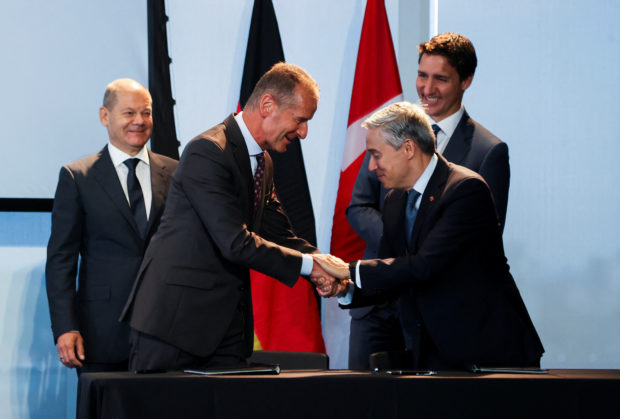
Dr. Herbert Diess, CEO and chairman of the board of management of Volkswagen AG, and Canada’s Minister of Innovation, Science and Industry Francois-Philippe Champagne shake hands during the signing of a memorandum of understanding as Canada’s Prime Minister Justin Trudeau and Germany’s Chancellor Olaf Scholz look on, at the Canada-Germany Business Forum, in Toronto, Canada, August 23, 2022. REUTERS/Carlos Osorio
FRANKFURT -German carmakers Volkswagen and Mercedes-Benz on Tuesday intensified efforts to secure access to key battery materials lithium, nickel and cobalt by striking cooperation agreements with top supplier Canada.
The move comes as automakers roll out their electric vehicle expansion strategies globally in a bid to challenge sector leader Tesla . These strategies depend on sufficient supplies of vital battery materials.
No financial details were disclosed for the memorandum of understanding (MoU) agreements, which were signed in Canada during a visit by German Chancellor Olaf Scholz and a delegation of German corporate representatives.
“The supply of battery raw materials and the production of precursor and cathode materials with a low carbon footprint will allow for a fast and sustainable ramp-up of battery capacity – a key lever for our growth strategy in North America,” outgoing Volkswagen Chief Executive Herbert Diess said.
Volkswagen aims to build, with partners, six large battery cell factories in Europe by 2030 with a capacity of around 240 gigawatt hours, as well as a dedicated factory in North America for which it is currently examining potential sites.
Mercedes-Benz, meantime, is preparing to go fully electric by the end of the decade wherever market conditions allow, and has recently struck a deal with China’s CATL to ensure battery cell supply in Europe.
As part of the MoU, Mercedes-Benz will explore a strategic partnership with Rock Tech Lithium under which the Canadian firm would supply the German carmaker and its battery partners with up to 10,000 tons of lithium hydroxide a year from 2026.
Volkswagen, too, aims to deepen cooperation with Canada’s mining sector and could even become a shareholder in local mining firms to make sure it is first in line when it comes to supply, the company said.
Volkswagen’s MoU also includes the production ramp-up of so-called cathode materials, which include nickel cobalt aluminium (NCA) oxide and nickel cobalt manganese (NCM) oxide.


